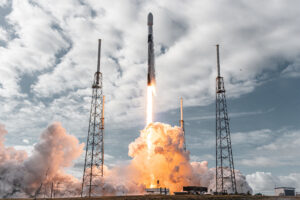Space Force seeks bids for rocket engine testing and space transportation technologies
By Sandra Erwin

WASHINGTON — The U.S. Space Force on May 11 issued three requests for industry proposals on technologies that the military will need to reach space and to operate spacecraft in orbit.
The Space and Missile Systems Center’s Launch Enterprise is seeking proposals for next-generation rocket engine testing, launch vehicle upper stage enhancements, and capabilities to maneuver in space. Proposals are due June 10.
The projects will be co-funded by the government and the contractors under “other transaction authority” agreements managed by SMC’s Space Enterprise Consortium (SpEC).
“SMC intends to partner with industry to invest in next generation rocket engine testing, upper stage resiliency enhancements, and orbital transfer and maneuver capabilities,” Col. Rob Bongiovi, director of SMC’s Launch Enterprise, said May 11 in a statement.
Bongiovi said these projects will deliver technologies for the next phase of the National Security Space Launch program. The Space Force last year selected United Launch Alliance and SpaceX as its launch providers for the next five years under NSSL Phase 2. SMC wants to start pushing the development of next-generation space transportation technologies in preparation for Phase 3.
The plan is to “accelerate development of transformational space access capabilities and make them available for future NSSL procurement contracts,” Bongiovi said. “We are eager to work with SpEC to maximize acquisition flexibility and speed to award the next generation rocket engine testing and upper stage resiliency enhancements by September 2021 and the orbital transfer and maneuver capabilities in early 2022.”
Col. Tim Sejba, SMC’s program executive officer for space development, said these are the first of many projects that will be overseen by SpEC. “Over the next 12 months, we expect to release 11 projects with a cumulative value exceeding $1.5 billion,” said Sejba.
SpEC was created by the Air Force in 2017 to attract startups and commercial companies from the space industry to bid on military projects. More than 500 member companies compete for contracts to develop prototypes that are co-funded by the government and the contractors. Other transaction authority OTA) deals move faster than traditional government contracts and require established defense contractors to partner with startups ad commercial suppliers.
May 12, 2021 at 04:36AM
via SpaceNews read more...

Post a Comment